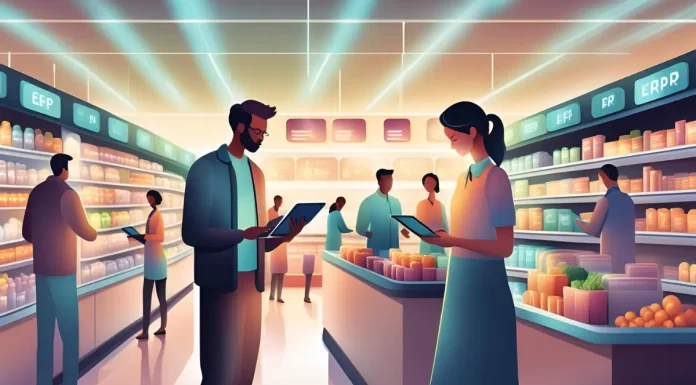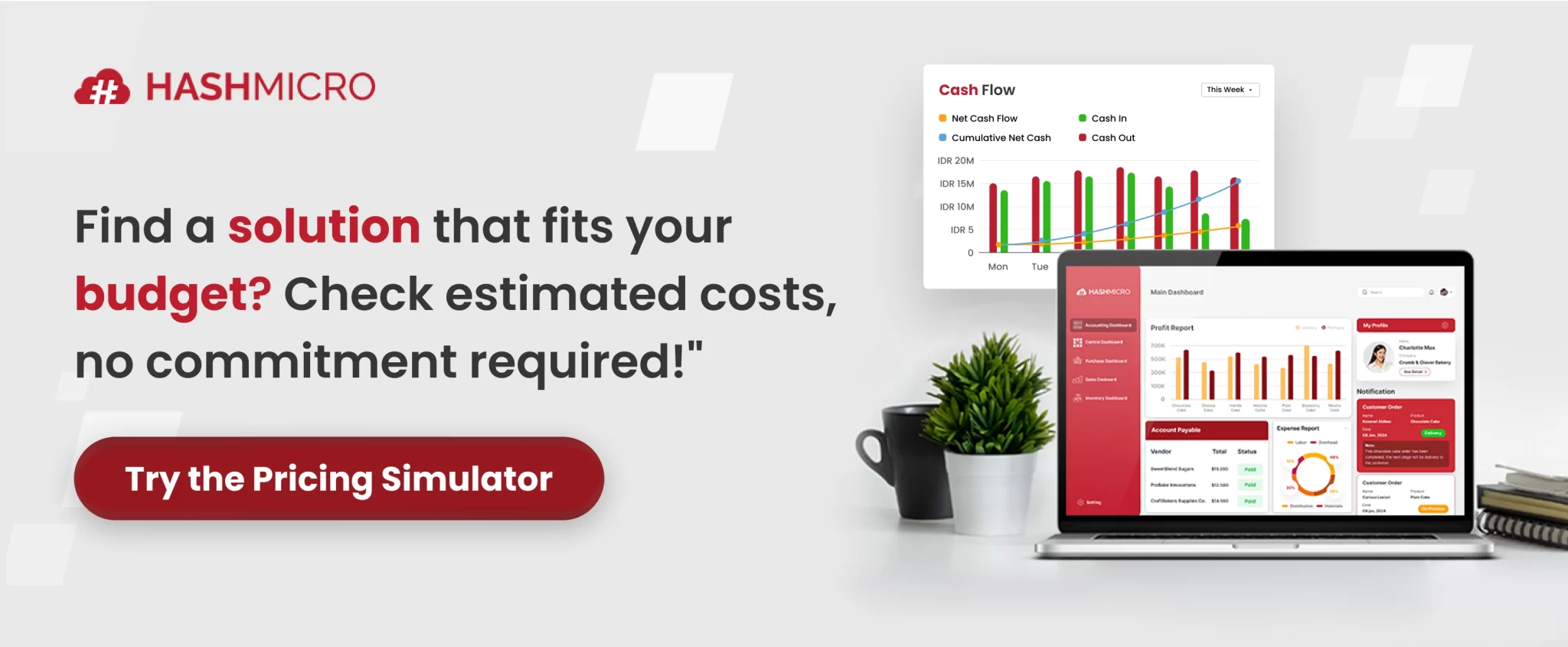As a wholesale supermarket owner in Singapore, I’ve experienced firsthand the challenges of managing daily operations, inventory, procurement, sales, and customer engagement, while keeping pace with changing consumer behaviors.
Implementing an ERP system can address these challenges by integrating all business functions into a single, unified platform. This centralization provides real-time insights, streamlines operations, reduces errors, and enhances decision-making.
With ERP wholesaling software, supermarkets can leverage timely data and automated processes to optimize operations, enhance customer experiences, and remain competitive in Singapore’s fast-paced retail market.
Key Takeaways
|
What Is Supermarket ERP Software?
Supermarket ERP software is a comprehensive platform designed to support business growth by managing every aspect of retail operations. It encompasses procurement, inventory management, billing, financial management, and other related functions.
Implementing ERP software in supermarkets can lead to improved operational efficiency, better customer service, and enhanced profitability by automating essential tasks, delivering real-time insights, and enabling smarter, data-driven decisions.
Trends in the Supermarket Industry
In recent years, Singapore’s supermarket industry has undergone significant transformations, driven by various trends that are shaping the retail landscape. It’s important to recognize and adapt to these trends to remain competitive and relevant.
Here are some recent trends influencing the supermarket industry in Singapore:
- Omnichannel shopping experience: The integration of various sales channels, including physical stores, e-commerce platforms, and mobile applications, to offer customers in supermarkets flexible purchasing options.
- Cashless payment: The adoption of cashless payment methods, driven by technological advancements and changing consumer preferences, to streamline transactions and reduce reliance on physical currency.
- Memberships and loyalty programs: Supermarkets in Singapore are focusing on providing personalized shopping experiences tailored to individual preferences and offering loyalty programs to incentivize repeat purchases and enhance customer loyalty.
- AI and big data technology: Leveraging advanced technologies like Artificial Intelligence (AI) and big data analytics to analyze transactional data, predict consumer behavior, and optimize inventory management.
- Expansion of quick deliveries: Supermarkets and grocery stores must offer fast, reliable deliveries to stay competitive against e-commerce platforms. An ERP system helps streamline operations, track orders, and generate invoices.
- Expansion of retail media networks: Supermarkets are leveraging customer data through retail media networks to maximize ROI on brand spending. Grocers increasingly sell ads to offset digital grocery margins and capitalize on online shopper relationships.
- Getting into the business of B2B: Implementing an ERP system streamlines operations, tracks deals, manages client data, and provides analytics to optimize relationships and profitability.
- Sustainability: Innovations such as non-GMO and environmentally friendly products enable retailers to offer ethical products while reducing water, land use, and methane emissions.
Challenges in Singapore’s Supermarket Industry and How to Solve Them
Supermarkets in Singapore face several challenges unique to the local landscape, requiring innovative solutions to overcome them:
- Difficulty finding the right suppliers: Manually searching for reliable suppliers can be time-consuming and prone to errors. ERP software with features like retail procurement enables supermarkets to access an integrated database of suppliers.
- Inefficient order tracking: Without proper systems, tracking orders across multiple channels can be slow and prone to errors. However, ERP software provides integrated tracking features that offer real-time visibility into order statuses, thereby enhancing customer satisfaction.
- Complex inventory management: Managing stock across multiple locations and channels can lead to overstocking. ERP software helps optimize inventory management with features like real-time stock monitoring and automated procurement processes.
- Ineffective customer data management: Supermarkets often struggle to consolidate and use customer information scattered across multiple systems. By integrating customer data, ERP software supports loyalty programs and enables retail-focused customer relationship management for more personalized engagement.
- Poor employee management: Supermarkets often face challenges in tracking staff performance, leading to inefficiencies and decreased productivity. However, ERP software streamlines HR processes, offering features such as attendance management and performance evaluation.
- Lack of integration: Many businesses struggle with disconnected systems that create data silos, leading to inconsistent information. However, ERP software enables seamless data exchange, improving coordination between departments.
- Improper procurement planning and sourcing process: Manual procurement planning can lead to inaccuracies and delays. Real-time, cloud-backed ERP systems ensure accurate, accessible forecasts across all departments and locations.
- Need to have end-to-end traceability: Manual traceability is error-prone and time-consuming, but an ERP system enables accurate, end-to-end tracking, helping businesses build trust and meet customer expectations.
The use of the best ERP software in the industry can be an effective solution to overcome the various challenges mentioned above. This software helps increase efficiency, reduce costs, and adapt to a competitive environment.
Key Benefits of ERP Software for the Supermarket Industry
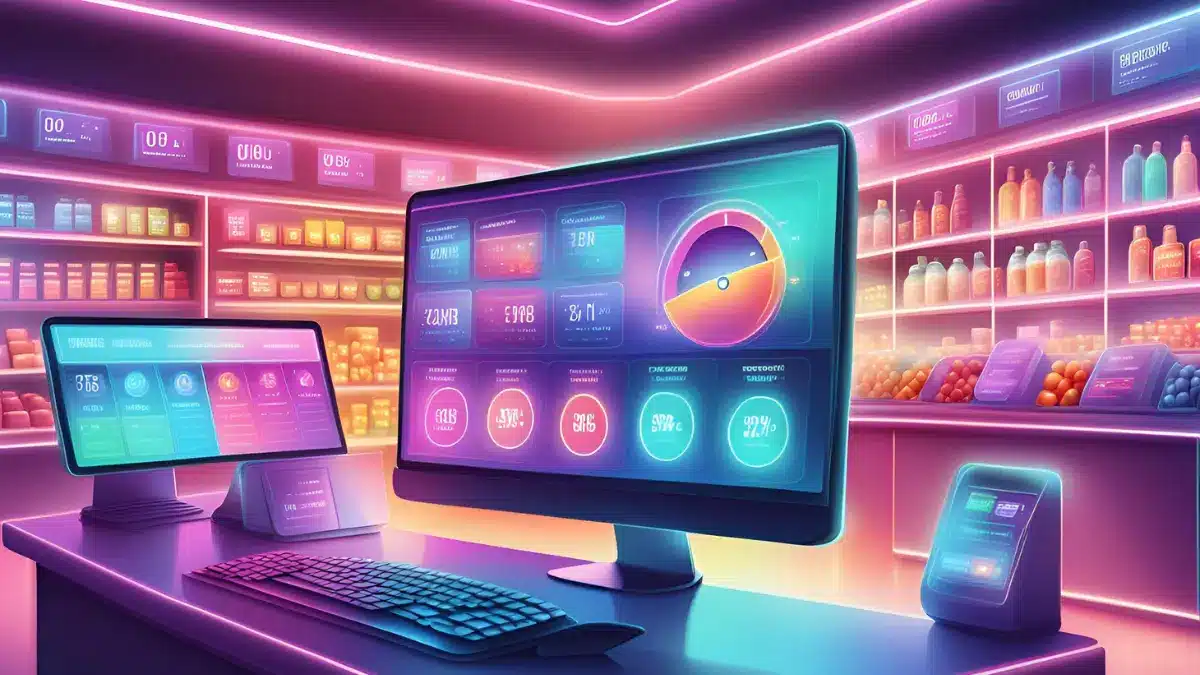
The supermarket retail industry in Singapore requires ERP software due to several need in managing complex operations. Here are some reasons why supermarkets need ERP software in their management:
Vendor Portal
ERP software simplifies the process of finding the right suppliers with the implementation of e-procurement and vendor portal features. Management can access an integrated supplier database containing information on reputation, product availability, and pricing conditions.
Search and filter features enable finding suppliers that match specific supermarket needs, thus speeding up procurement processes and ensuring better product quality for customers.
Efficient order tracking
With integrated tracking features, various information about order status can be accessed quickly and accurately, from the ordering process to delivery. This allows management to monitor and manage the supply chain more effectively, reducing delays, and ensuring customer satisfaction.
Inventory optimizer
ERP software features such as real-time stock monitoring, demand forecasting, and automated purchasing processes enable supermarkets to optimize inventory management and maximize sales by ensuring product availability, as well as prevent understock, overstock, or dead stock.
Customer data management
ERP software helps in managing customer data by providing an integrated platform across all branches to collect, save, and analyze customer information. The information is useful for identifying purchasing patterns, product preferences, and shopping behavior, which can then be used to offer incentives.
Employee management
With features such as attendance management, leave management, and performance evaluation, ERP software simplifies HR management tasks and improves overall productivity and efficiency in the supermarket environment. ERP software also facilitates scheduling and centralized employee administration.
Integration with other modules
Data generated from one module can be easily accessed and used by other modules without the need for complex manual processes or data duplication. This can improve operational efficiency, ensure data consistency, and facilitate accurate decision-making based on up-to-date and accurate information.
Supermarkets should opt for the best supermarket software available to best suit their needs and requirements to enhance operational efficiency.
Here is a table summary of the key benefits of ERP software for the supermarket industry to help you easily understand:
| Key Benefits of ERP Software for the Supermarket Industry | Description |
|---|---|
| Vendor portal | ERP streamlines supplier management through e-procurement and vendor portals, providing a centralized database with supplier information and product availability for faster and more reliable procurement. |
| Efficient order tracking | Integrated tracking features allow supermarkets to monitor orders from placement to delivery, improving supply chain management, reducing delays, and enhancing customer satisfaction. |
| Inventory optimizer | Real-time stock monitoring, demand forecasting, and automated purchasing help optimize inventory, prevent overstock or shortages, and maximize sales opportunities. |
| Customer data management | ERP centralizes customer information across all branches, enabling supermarkets to analyze purchasing patterns, preferences, and behavior to create targeted promotions and incentives. |
| Employee management | ERP streamlines HR tasks, including attendance tracking, leave management, performance evaluation, and scheduling, thereby boosting productivity and simplifying workforce administration. |
| Integration with other modules | ERP ensures seamless data flow between modules, reducing manual work, maintaining data consistency, and facilitating accurate and informed decision-making. |
Optimize Supermarket Management with HashMicro’s ERP Software
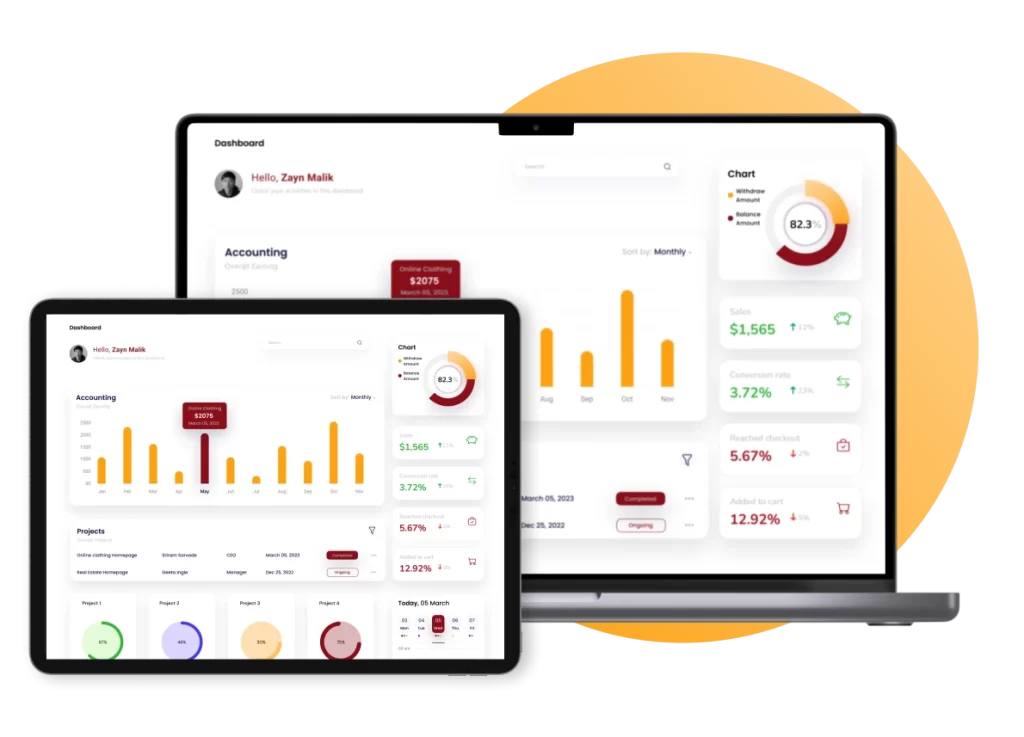
HashMicro’s ERP software is designed to integrate all aspects of supermarket operations, making management more efficient and effective. It reduces errors, prevents stockouts, and ensures timely fulfillment, which directly improves customer satisfaction.
The platform features essential modules, including inventory management, sales tracking, accounting, supermarket cashier software with an automated feature, procurement, and customer relationship management (CRM). These modules are fully integrated, enabling departments to share information in real time.
Key features of HashMicro ERP for supermarkets include:
- Inventory Management: Real-time tracking and automated reorder alerts to prevent stockouts.
- Sales Tracking: Monitor team performance, sales trends, and revenue metrics.
- Accounting & Cashiering: Streamline financial operations and reconcile transactions efficiently.
- Customer Relationship Management (CRM): Manage loyalty programs, promotions, and customer data.
- Procurement Management: Optimize supplier orders and reduce waste.
- Home Delivery & Omnichannel Integration: Coordinate online and in-store sales with seamless logistics.
- Real-Time Reporting & Analytics: Gain insights to make data-driven decisions quickly.
Conclusion
ERP system plays a crucial role in maintaining smooth business interactions with customers, particularly when facing operational challenges such as limited visibility, delayed follow-ups, and inconsistent sales processes.
HashMicro’s ERP System offers an integrated solution for wholesale supermarkets to automate sales workflows, monitor team performance in real time, and enhance the overall customer experience.
For supermarkets interested in experiencing how HashMicro ERP supports professional sales management, a free demo session is available and can be scheduled at your convenience.
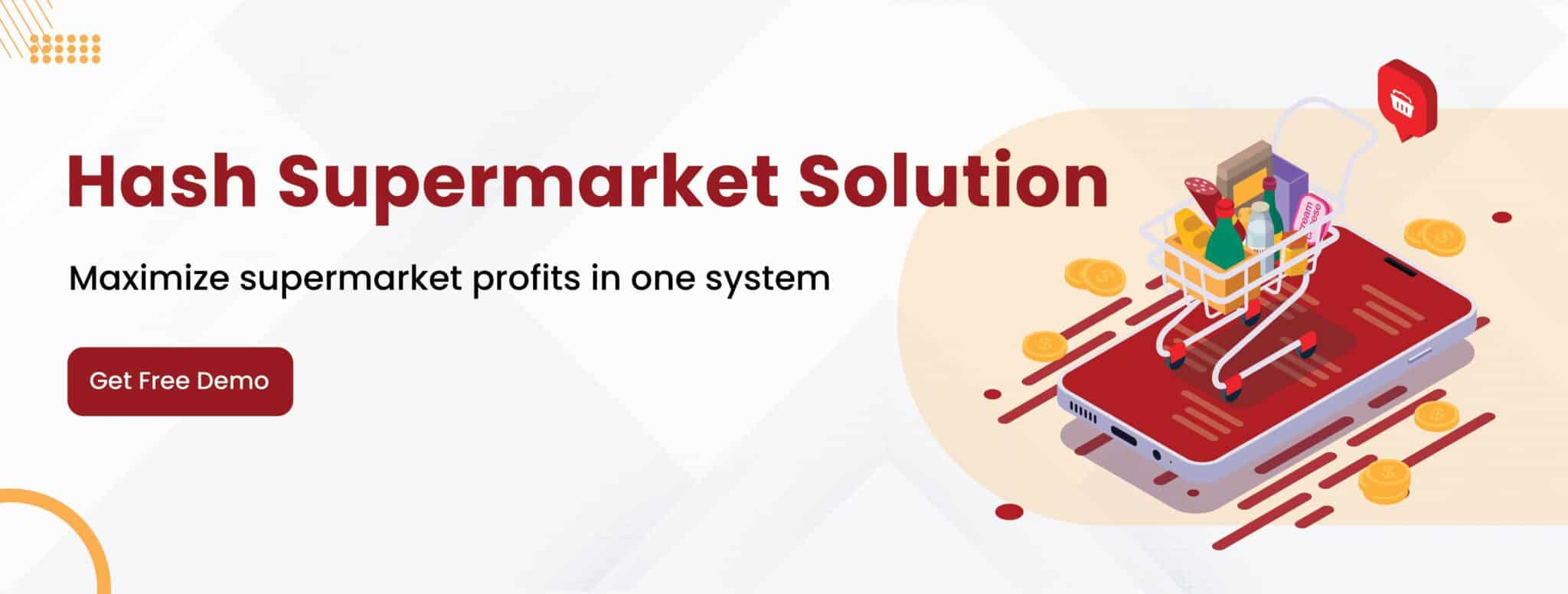
Frequently Asked Questions
-
What is the meaning of a wholesale supermarket?
Wholesale stores, also known as wholesalers or wholesale distributors, are businesses that sell goods in large quantities at lower prices, typically to retailers, other companies, or professional users.
-
What is a wholesale grocer?
Wholesale grocers purchase all their items directly in bulk, which allows them to negotiate lower price points and then pass those savings on to their customers, such as restaurants, food trucks, cafes, and hotels.
-
Why is wholesale cheap?
Wholesale prices are lower because you’re buying in bulk directly from the source. The more you buy, the lower the cost per item. Retail prices are higher since they include a markup from the wholesale price. You’re paying for convenience and smaller quantities.

